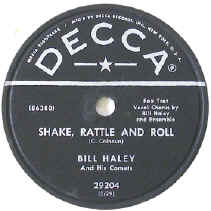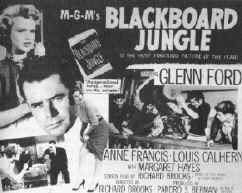Bill Haley and His
Comets
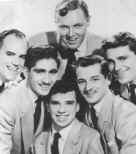
1954 Comets
L to R: Billy Williamson, Johnny Grande, Joey Ambrose, Marshall
Lytle, Dick Richards
Billy Haley and his Comets fused elements of country music,
Western Swing, and black R&B to produce some of rock and
roll's earliest hits. His "Crazy, Man Crazy" from 1953
was the first rock and roll record to make the pop charts.
Members:
Billy Haley - guitar
Johnny Grande - accordion and piano
Billy Williamson - steel guitar
Rudy Pompelli - sax
Marshall Lytle - bas replaced by Al Rex
Francis Beecher - Spanish guitar
Don Raymond - drums - replaced by Ralph Jones in 1953
Dick Richards - real name Richard Bocelli - drums
|
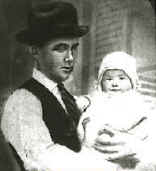
A six month old Haley with father
|
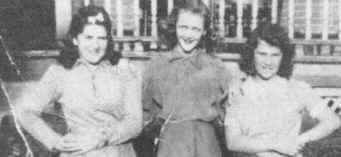
Margaret Haley far right
|
Bill Haley was born in Highland Park, Michigan on
July 6, 1925 to William and Maude Haley. The couple's second
child, Haley had a sister Margaret who was born two years
earlier.
When Haley was four while having an operation to
repair an inner ear ailment the doctor accidental cut an optic
nerve. The result was that Haley would never ever see out of his
left eye.
The Haleys had moved to Detroit from Firebrick, Kentucky,
where William Sr. found work in a nearby service station as a
mechanic while his wife gave piano lessons in their home for
twenty-five cents an hour. Maude Haley, a woman of strong
religious convictions, had come to America with her family from
Ulverston in Lancastshire, England before the First World War.
Later the family moved to Boothwyn, near the town of Chester,
Pennsylvania.
William Haley Sr. was a quiet man from the hills of Eastern
Kentucky who had to quit school early to find work. His father
had died young and his mother desperately needed his income to
raise the younger children. William Sr. struggled with this
burden until the last of his brothers and sisters were educated
and on their own. Only then, after he was thirty years old, did
he marry.
Haley's father played the banjo and mandolin. Though he
couldn't read music he had an ear for country music and was able
to pick out any tune he wanted by ear.
At thirteen Haley received his first guitar. His father taught
him to play the basic chords and notes by ear. It was at this
time he began his dream of becoming a singing cowboy like
the ones he idolized every Saturday afternoon at the movie houses
in nearby Marcus Hook or Chester.
In June of 1940, just before his fifteenth birthday, Haley
left school after finishing the eighth grade and went to work
bottling water at Bethel Springs. This company sold pure spring
water and fruit flavored soft drinks in a three state area. Here
he worked for 35 cents an hour, filling large five gallon glass
bottles with spring water. Only the absolute best of the
best were making a living from making music.
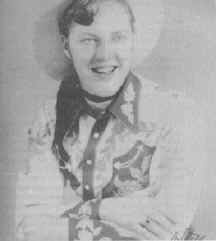
Bill Haley "The Rambling Yodeler, 1946
|
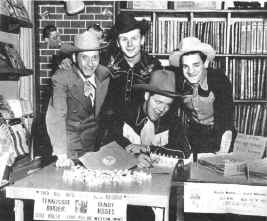
Promoting Candy Kisses
Photo courtesy Rex Zario Collection
|
At 18 he made his first record "Candy
Kisses" and for the next four years was a guitarist and
singer with country and western bands.
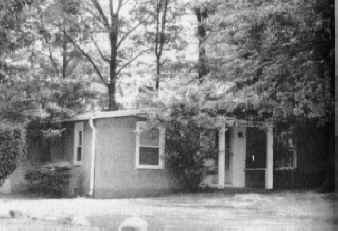
Haley family home on Foulk
Road, Booth's Corner
|
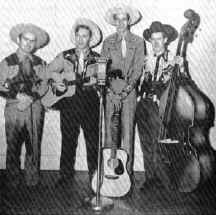
The Range Drifters
Brother Wayne, Bill Haley, Bob Mason, Lloyd Cornell circa
1948
|
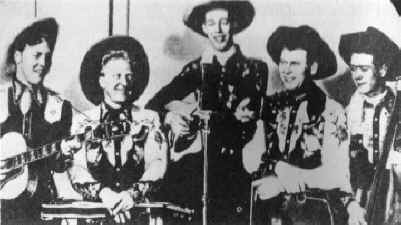
The Downhomers
Bill Haley, Shorty Cook, Bob Mason, Guy Campbell,
Lloyd Cornell
|
After time on the road with the Down Homers Haley returned to
his parents' home in Booth's Corner in September of 1946. He was
ill, disillusioned and so broke he had to walk from the train
station in Marcus Hook four miles to Booth's Corner. His only
request to his mother was not to tell anyone he was home, not
even his fiancée Dorothy. Bill fell into bed and slept thirty
hours. Over the next two weeks Mrs. Haley slowly nursed her
itinerant son back to health.
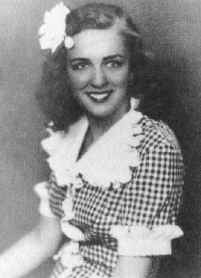
Dorothy Haley
By the age of 21, Haley felt he wasn't going to
make it big as a cowboy singer, ill, he left the 'Downhomers',
and returned to Chester to host a local radio program.. At this
time he also married his childhood sweetheart Dorothy Crowe a
beautiful part American Indian girl.
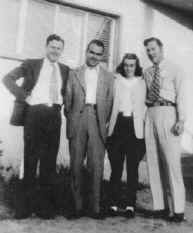
Bill Haley as musical director WPWA 1949
Left to Right: Julian Barnard, Wayne Wright, Fran Chandler, Bill
Haley
Haley was hired in 1947 as musical director for
radio station WPWA. Working twelve to sixteen hours a day, six
days a week he interviewed dozens of local people, always looking
for good ideas and new talent. Each Sunday he would go to Radio
Park and invite celebrities to do a special half hour program
where he would interview them and ask them to sing or play their
latest tunes.
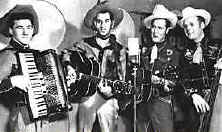
The Four Aces of Swing
Left to Right: Al Constantine,Tex King, Bill Haley, and Julian
"Bashful Barney" Barnard
It was during this time that he put together a band The Four
Aces of Swing that performed on the his show. In 1948 on the
Cowboy label Haley recorded with The Four Aces of Western Swing.
The Four Aces disbanded in mid '49 and Haley formed a new band,
the Downhomers with which he recorded country music. Later he
left the group to return Chester to host a local radio program.
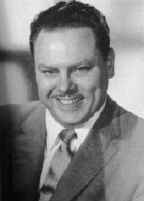
Jimmy Myers
|
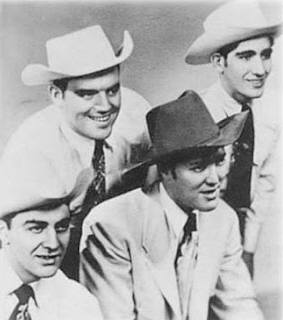
Bill Haley and the Saddlemen
Back Row (L-R) Bill Williamson, Johnny Grande
Bottom Row (L-R) Al Rex, Bill Haley
|
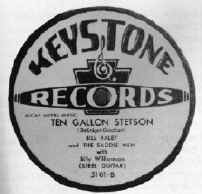
|
In the summer of 1950, through the efforts of Jimmy Myers,
Bill Haley and his Saddlemen cut their first records. They were
on Ed Wilson's Keystone label, a small Philadelphia independent
publisher. The songs were standard western swing tunes:
"Deal Me A Hand" /" Ten Gallon Stetson" and
"Susan Van Dusan" /" I'm Not To
Blame." They were the first recordings of the band that
would become the nucleus of the world famous Comets.
With their new, exciting sound the name
"Saddlemen" no longer seemed appropriate. According to
Marshall Lytle, it was Bob Johnson, Program Director at WPWA who
first suggested the name Haley's Comets. "Ya 'know,
with a name like Haley, you guys should call your group the
Comets!"
Just before the Thanksgiving holidays in 1952, Haley's band
changed their name and their image for the last time. Off came
the cowboy boots and the white Stetsons. With some regrets and
more than a little apprehension, the four young musicians, turned
their backs on their beloved country/ western music and bravely
faced an unknown future as "Bill Haley and His Comets".
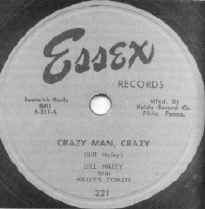
One example of that change was "Rock the Joint"
which sold 75,000 copies. In 1953 he wrote "Crazy Man
Crazy" which became the first rock and roll record to make
the Billboard pop chart reaching the Top 20.
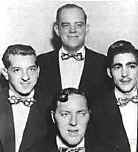
Saddlemen became the Comets. This photo is of the 1952
Comets.
Clockwise from the bottom: Bill Haley, bassist Marshall
Lytle, Steel guitarist Billy Williamson and accordionist
Johnny Grande.
|
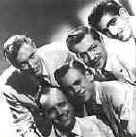
Comets in 1953
Clockwise from the left: Billy Haley, Johnny
Grande, Marshall Lytle, Charle Highler, Billy
Williamson
|
On April 1st, 1954, Jimmy Myers, Milt
Gabler and Bill Haley met in Decca's New York offices. The three
men discussed a contract for four records a year, a standard
royalty of 5% of sales, $5,000.00 in advance royalties and the
understanding that Decca would mail out each release to two
thousand disc-jockeys with full support publicity. Plus full page
ads in Billboard and Cash Box magazines! With the deal set and
signed, the three men shook hands and agreed on a recording date
four days after the Essex contract was due to expire.
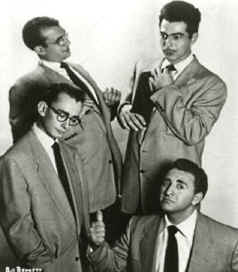
Sonny Dae and His Knights
Clockwise from left: Hal Hogan
Paschal Vennnitti, Art Buono, unknown
|
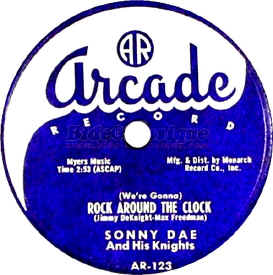 |
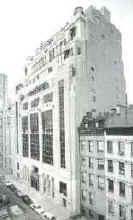
Pythian Temple
|
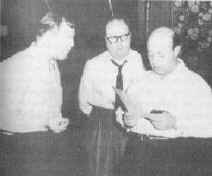
Going over arrangement at Studio A
R-L: Haley, manager Jim Ferguson
Milt Gabler
|
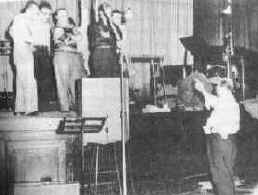
Comets at Studio A at Pythian
Temple
Milt Gabler below stage, circa 1956
|
Milt Gabler was inducted into the Rock and
Roll Hall of Fame in 1991
One young Comet fan was Peter Ford, son of actor
Glenn Ford and actress Eleanor Ford. Glenn Ford would play the
lead role of Richard Dadier, a new teacher at North Trades
School, in Blackboard Jungle. the movie's
screenwriter and director Richard Brooks would occassionaly meet
with Ford at his house to go over upcoming scenes. During one of
those times Brooks told Ford he was looking for music for the
movie's sound track, something appropriate for what would
be a controversial and shocking film. Ford suggested that
brooks listen to some of Peter's record collection. Out of that
collection Brooks decided to use (We're Gonna) Rock Around the
Clock for the Black Board Jungle soundtrack. It would be played
at the film's opening and the movie's closing credits.
It was while at Decca that Haley fell under the
influence of Milt Gabler who had produced Louis Jordan. Gabler
would convince Haley to change his sound. That change would be
evident when on April 12th 1954, at Pythian Temple Studio with
the recording of "Rock Around the Clock." The song that
introduced rock & roll to White America. "Rock Around
the Clock." Originally recorded by Sonny Dae in 1952,
"Rock Around the Clock" had initial sales topping
75,000. "Rock Around the Clock" was a modest hit, until
the song was used as the title track of "The Blackboard
Jungle," a movie about juvenile delinquents, some 12 months
later.
His next record a cover of Joe Turner's "Shake, Rattle
and Roll' was a top ten hit. It was the first rock &
roll record to sell a million copies
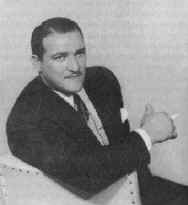
Danny Cedrone
On July 17, 1954, three months after the Shake, Rattle and
Roll session the Comets lost their studio guitarist Danny
Cedrone, who laid on Rock Around the Clock the first recognizable
guitar solo of rock and roll. Cedrone had been found dead with a
broken neck at the bottom of a flight of stairs in South
Philadelphia. Cedrone had returned from an early engagement at a
nearby 819 Bar, his wife asked him to go out and pick-up
something to eat. He never made it back. He would be replaced by
Francis Breecher who had been introduced to the Comets by Billy
Williamson a year earlier.
The next really big hit came with "See You Later
Alligator" which sold a million copies within a month.
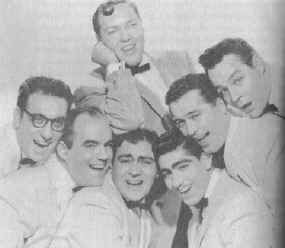
Comets in 1955
L to R counter clockwise from top
Bill Haley guitar, saxophonist Rudy Pompilli, Bill Williamson,
bassist Al Rex, accordianist Johnny Grande, drummer Ralph Jones
and guitarist Fran Beecher
The Jodimars
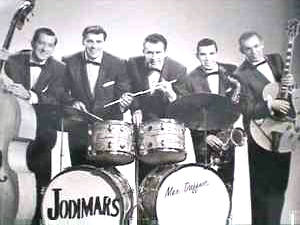
(L-R) Marshall Lytle, Dick Richards, Max Daffner, Joey
D'Ambrosio, Chuck Hess
While Haley, Ferguson, Williamson and Grande
shared in the band's profits, the rest of the Comets worked on
salary, In September, 1955 Dick Richards, Marshall Lytle and Joey
D'Ambrosio went to the Comet's manager Jim Ferguson and asked for
a $50 raise. Turned down they gave two weeks notice. They then
went and signed with Capital Records and recorded as the
Jodimars. Haley replaced them but resented their leaving for many
years.
Lytle was replaced by Al Rex Haley's original
basist from the Saddlemen, D'Ambrosio by Rudy Pompilli and
Richards by Ralph Jones.
"We took parts of four different types
of music: dixieland, country and western, rhythm and blues, and
our old jazz standards"
Bill Haley, BBC interview, September 14, 1956
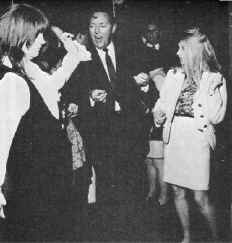
London 1968
In 1957, Haley began touring touring Britain as his popularity
began fading at home. The first American Rock and Roll star
to come to Britain, he was met with large and enthusiastic
crowds. The British soon found out what American teenagers
already knew. Haley with his spit curl was old (30), overweight
and rather mechanical when compared to Little Richard, Jerry Lee
Lewis, Gene Vincent and Elvis who were younger and who's music
was more exciting. Bill Haley & His Comets were there first,
but now they were part of the establishment.
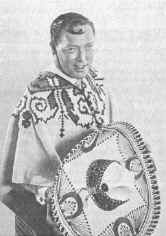
In Mexico
In 1960 Haley, embroiled in
major legal problems relating to his divorce, fled to Mexico,
where he became known as the "Spanish King Of Twist"
and had a best-selling record in Latin America with "Florida
Twist".
Bill Haley y sus Cometas (as the
band was known in Hispanic America) signed with the Orfeón label
of Mexico and scored an unexpected hit with "Twist
Español", a Spanish-language recording based on the twist
dance craze, which was sweeping America at the time. Haley
followed up with "Florida Twist" which was for a
time the biggest-selling single in Mexican history. The band had
continued success in Mexico and Latin America over the next few
years. They hosted a television series, Orfeon a Go-Go, and made
cameo appearances in several movies, lip-synching some of their
old hits. Most of the band's output during these years was
instrumental recordings. The Comets' association with
Orfeon/Dimsa ended 1966.
In 1967, Haley had no recording
contracts at all, although the band continued to perform
regularly in North America and Europe. During this year,
Haley—without the Comets—recorded a pair of demos in
Phoenix, Arizona: a country-western song, "Jealous
Heart" and "Rock on Baby". Neither recording would
be released for 30 years. In 1968, Haley and the Comets recorded
a single for the United Artists label, a version of Tom T. Hall's
"That's How I Got to Memphis", but no long-term
association with the label resulted. In order to revive his
recording career, Haley turned to Europe.
By the late 1960s, Haley and the
Comets were considered an "oldies" act, though the
band's popularity never waned in Europe. The group signed a
lucrative deal with Sonet Records of Sweden in 1968 and recorded
in a new version of "Rock Around the Clock", which hit
the European charts that year. The band recorded a mixture of
live and studio albums for the label over the next decade.
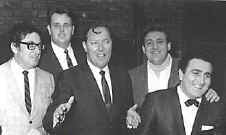
Comets 1969
L-R: Rudy Pompilli, John Lane,Bill Haley, Nick Masters, Al Rappa
In the United States in 1969,
promoter Richard Nader launched a series of rock and roll revival
concert tours. At one of the first of these shows, held at
the Felt Forum at Madison Square Garden in New York City, Haley
received an eight-and-a-half-minute standing ovation following
his performance.
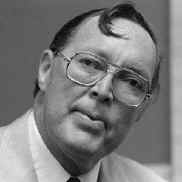
Haley in 1974
In February 1976, Haley's
saxophone player and best friend, Rudy Pompilli, died of cancer
after a nearly 20-year career with the Comets. Haley continued to
tour for the next year with a succession of new sax players, but
his popularity was waning again. In early 1977, Haley announced
his retirement from performing and settled down at his home in
Mexico.
In 1979, Haley was persuaded to
return to performing with the offer of a lucrative contract to
tour Europe. Most of the new group of Comets were British. Haley
appeared on numerous television shows and in the movie Blue Suede
Shoes, filmed at one of his London concerts in March 1979. During
the March tour, Haley recorded several tracks in London for his
next album, Everyone Can Rock & Roll, issued later in 1979,
was the last release of new recordings by Haley before his death.
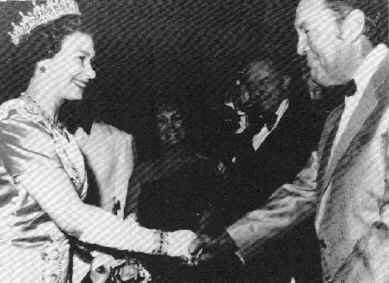
In November 1979, Haley and the
Comets performed for Queen Elizabeth II, a moment Haley
considered the proudest of his career. It was also the last time
he performed in Europe and the last time most fans saw him
perform "Rock Around the Clock
In 1980, Bill Haley and His
Comets toured South Africa, but Haley's health was failing, and
it was reported that he had a brain tumor. The tour was
show Haley in good spirits and good voice. Planned
concerts and proposed recording sessions in New York and Memphis
were cancelled, including a potential reunion with past members
of the Comets. Haley returned to his home in Harlingen, Texas,
where he died in his sleep of an apparent heart attack on
February 9, 1981, at the age of 55.
In April 1981, Bill Haley &
His Comets returned to the British musical charts once again when
MCA Records (inheritors of the Decca catalogue) released
"Haley's Golden Medley", a hastily compiled edit of the
band's best-known hits in the style of the then-popular
"Stars on 45" format. The single reached Number 50 in
the UK but was not released in the United States.
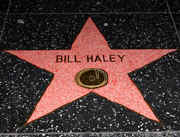
Hollywood Walk of Fame
|
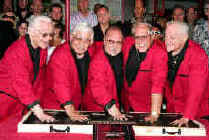
(L-R) Fran
Beecher, Joey Ambrose, Marshall Lytle, Johnny
Grande, Dick Richards
|
In 1987, Bill Haley
was inducted into the Rock and Roll Hall of Fame. At that time,
supporting bands were not also named to the Hall of Fame. This
policy was subsequently changed, and in 2012 a special committee
of the Hall of Fame inducted the Comets. Bill Haley and His
Comets were also inducted into the Rockabilly Hall of Fame. In
June 2005, Bill Haley And His Comets were inducted into the
Michigan Rock and Roll Legends Hall of Fame. In July 2005, the
surviving members of the 1954–55 Comets represented Haley
when Bill Haley and His Comets were inducted into Hollywood's
Rockwalk, a ceremony also attended by Haley's second wife and
youngest daughter. The Comets placed their handprints in cement;
a space was left blank for Haley.
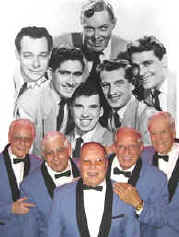
2010 Comets then and now
(L-R) Billy Williamson, Johnny Grande, Joey Ambrose, Marshall
Lytle, Dick Richards
After 1957 Haley had a few minor hits, but spent the remainder
of his life touring and playing Rock and Roll Revival shows. In
the early morning hours of February 9th, 1981, Bill called two of
his sons, Scott and Jack, and had his last known conversations.
He died, in his sleep of an apparent heart attack, about 6:30
that morning at his home in Harlingen, Texas.
Rudy Pompilli, died of lung
cancer February 5. 1976 in Philadephia.
Marshall Lytle died of lung cancer May 28, 2013 at his home in
Port Richey, Florida, he was 79.
Dick Richards died July 12, 2019 at the age of 95.
Al Rex, real name Al Piccirilli, May 24, 2020 at the age of the
age of 92.
Joey Ambrose died August 9, 2021 at the age of 87.
Bill Haley was was inducted into the Rock and
Roll Hall of Fame in 1987.
The Comets were inducted into the Rock and Roll
Hall of Fame in 2012
We'll
Always Remember























